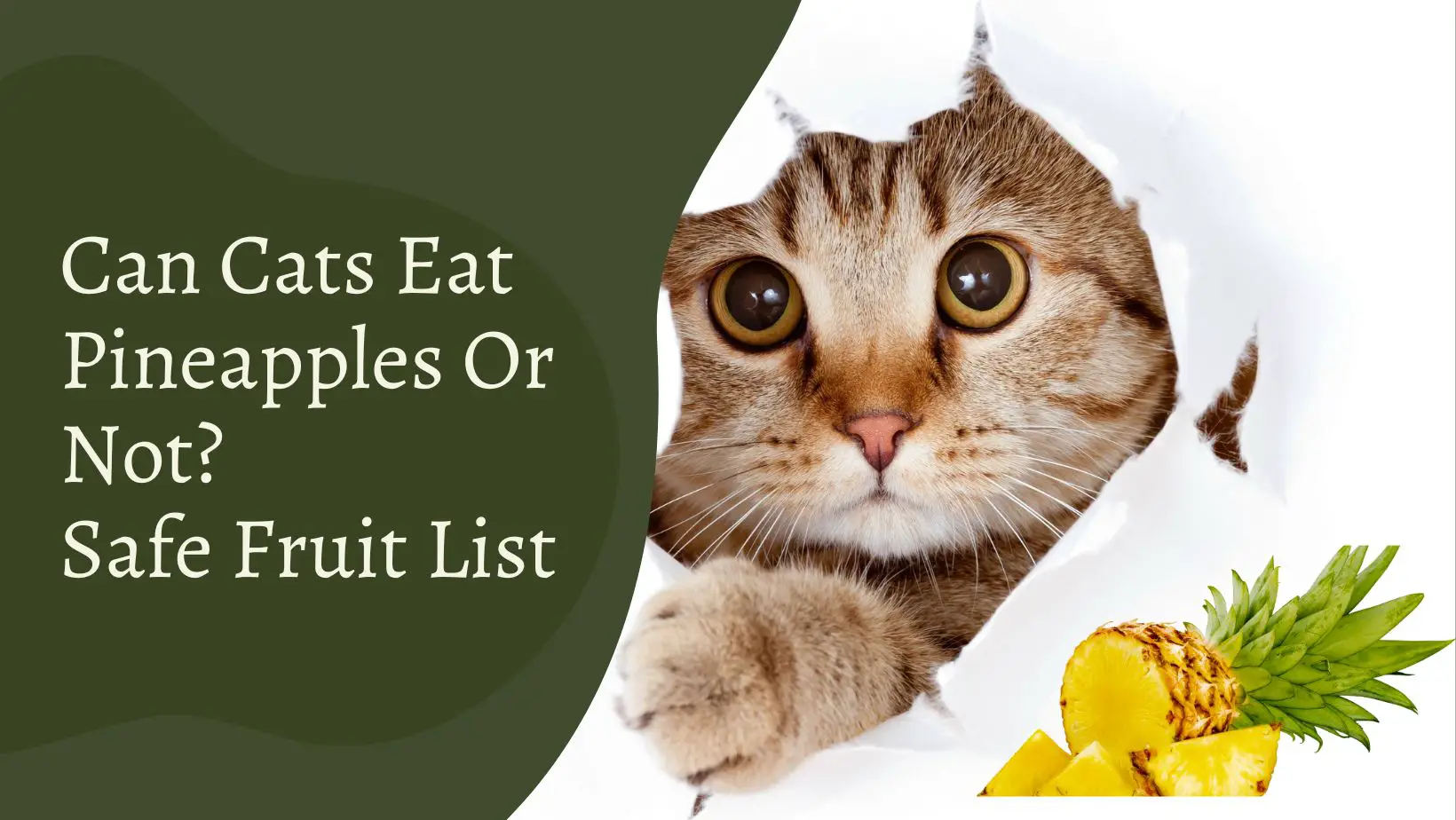
Pineapples are high in vitamin C, B6, potassium, and antioxidants, among other nutrients. Pineapples are a pleasant snack, particularly on a hot summer day, but still, question arises can cats eat pineapples?
Cats are obligate carnivores, which means they must consume meat. Fruits and vegetables aren’t required in their diet, but the occasional fruit won’t harm them. Because cats don’t drink much water, pineapple is a healthy source of hydration for them, and it may be used as a substitute on occasion. We do wish to point you that processed pineapple from a can should not be given to your cat since it contains syrup, which increases the sugar level.
A pineapple is a tasty fruit that is also a nice reward. Even whether served freshly sliced chopped or swimming in syrup within a container, they are delivered in juice form. They’re a great source of flavour. If you’re curious about whether any portion of a pineapple fruit is safe for your cat to eat, go here. Then you’ve arrived at the correct location.
Are There Any Benefits to Feeding Your Cat Pineapple
Cats require meat-based meals since they are obligate carnivores. However, the digestive tract of a cat is not designed only to consume or break down nutrients and energy from plant stuff. From the tiniest member of the feline family to the world’s biggest cat, the tiger, one of them is well-suited to processing plant-based fibres. They lack the digestive enzymes needed to break down plant-based fibre, fruits, and vegetables and extract minerals.
Are Pineapples really Toxic To Cats?
No, cats are not poisoned by them. If you wish to share pineapples with your cats, you can do so with caution. Pineapples contain an enzyme called actinidain. Some cats may be allergic to this enzyme. Cats are not poisoned by them. However, they might have an effect on your cat, causing vomiting or diarrhoea. Sugar can be digested by certain cats, but only in little amounts. It doesn’t unkind you must put your kitten’s digestive system to the test. We do not advise you to do so.
Why Would Cats Like Pineapple?
Cats are obligate carnivores, which means they eat meat for virtually all of their calories. That is not the case with humans (who are omnivores) or dogs (who need meat but also get nutrition from plants). They don’t have to ingest plant materials, but they can eat a tiny quantity of it if they choose to.
Many cats like to chew on grasses or other plants, and some cats even like to eat fruit. Cats lack the taste receptors that allow them to appreciate sweet flavours, which makes it difficult to understand why. Pineapple’s intense sweet and tart flavour is generally forgotten by them. However, some cats may enjoy eating the foods that their human family members enjoy, even if they don’t like the taste. Cats enjoy the feel of many fruits and may be interested in biting on a pineapple. Finally, the delicious wetness in pineapples may appeal to cats.
Some cats may be fascinated in the pineapple’s spiky leaves as well as the fruit. They like chewing on these leaves in the same way they do grasses. Pineapple leaves are typically okay to gnaw on, but if you’re concerned about pesticide residue on the leaves, keep your cat away.
What Fruits Can Cats Consume?
The following fruits are safe to give to your cat in tiny amounts occasionally.
Apples
If you want to feed apples to your cats, make sure they’re organic and unpeeled. Remove all seeds as well (they contain cyanid and are poisonous). Because cats are unable to perceive sweet tastes, a little slice of apple may or may not appeal to your cat.
Bananas
Bananas are not poisonous to cats, but their high fibre content makes them difficult to digest. They also have a high potassium content. Bananas are also heavy in sugar, so keep them to a minimum and in tiny quantities if you do serve them.
Blackberries
Other berries, such as blackberries, are safe for cats to consume and provide an excellent source of fibre and vitamins A, C, E, and K. To avoid your cat choking, provide berries in little pieces and only as a treat, rather than in huge quantities.
Blueberries
Blueberries are healthy for cats, and the antioxidants they provide may be useful to your feline companion; some cat meals even contain blueberry powder. Blueberries are high in fibre and water, which is beneficial to dogs that are prone to dehydration. This is a pleasant treat to give out on sometimes.
Cantaloupe
A small amount of cantaloupe is OK for your cat, and cats genuinely like this delicacy (in addition to dogs). Cantaloupe is said to appeal to them because of its texture and scent. Of course, make sure the melon is deseeded and sliced into tiny pieces, so your cat doesn’t choke; you could even purée it.
Honeydew
Honeydew is non-toxic to cats, according to the ASPCA. Although it is a novelty fruit for many, you should consider giving it to your cat as a treat on occasion. It’s high in vitamins A and C, and it’s also high in fibre.
Raspberries
Raspberries are a delicious treat for your cat. They’re low in sugar and high in fibre, with anti-inflammatory effects to boot. On the other hand, Raspberries should only be fed in moderation since they naturally contain trace levels of xylitol, which is hazardous to animals in excessive doses, mainly if synthetically generated. Never offer your cat raspberries in large quantities.
Watermelon
Watermelon without seeds is safe to feed to cats, and most cats prefer it. It’s a fantastic treat for cats that have trouble staying hydrated. However, because of the high sugar content, cats that are diabetic or sensitive to vast amounts of sugar should not be given sweets like watermelon.
Pineapple
Pineapple is high in vitamins and minerals, making it good for the immunological and digestive systems. However, because this tropical fruit is strong in sugar, it should only be offered in little amounts once the peel and hard portions have been removed.
Pumpkin
As long as the outer peel and seeds are removed, pumpkin is absolutely fine for felines to eat. In fact, adding two or three spoonfuls of cooked pumpkin puree to your cat’s food will assist with diarrhoea and constipation.
What Kinds of Human Foods Can Cats Consume?
Cats can consume a wide variety of human foods, counting fruits and vegetables. Although cats are notorious for being finicky eaters, providing some variety and nutritious treats can help to broaden their horizons and improve their nutrition.
Cats are classified as obligate carnivores, which means they require a lot of meat and protein in their diet to be healthy. They should not be on a vegetarian or vegan diet because taurine, which is necessary for your cat’s health, is missing from these diets. Animal protein is the only source of taurine.
Despite the fact that your cat must eat a carnivorous diet, you can make sure to include a variety of colourful foods in their daily routine; just remember to do so in moderation. Additionally, consult your veterinarian first. It’s especially critical if your cat has any known health issues, because rich, nourishing diets might put organs and the body at risk if your cat already has problems.
Can cats eat strawberries
You might be asking if cats can eat strawberries at this point. The good news is that cats can eat strawberries if they adhere to a few simple guidelines. Strawberries are regarded as a safe human meal to provide to your cat. They are non-toxic to cats, dogs, and horses, according to the ASPCA. They’re delicious, healthy, and cat-friendly. Because cats lack’sweet’ taste receptors and hence the capacity to taste’sweet’ items, it’s unclear why they like to eat strawberries. If you own a cat, you’re well aware of how curious cats are and how much they like testing anything you’re eating.
Is it possible for cats to eat chocolate?
Yes, cats can eat tiny amounts of chocolate without suffering any consequences. That does not, however, imply that they should. Chocolate isn’t good for cats in general. When a cat consumes more than a modest amount of chocolate, major negative effects might ensue, and cats can die as a result of chocolate consumption.
Chocolate is harmful to cats because it includes theobromine, a diuretic and heart activator, as well as caffeine. These chemicals are found in various concentrations in different types of chocolate. The larger the quantity of theobromine and caffeine in the chocolate, the better. Because most chocolate contains far more theobromine than caffeine, doctors commonly determine the poisonousness of chocolate for cats based on theobromine levels.
Is There Such a Thing as Too Much Chocolate for a Cat?
Cats are not poisoned by a fair bit of chocolate. If your cat eats a few Hershey’s Kisses, he won’t need to have his stomach pumped. However, consuming too much chocolate (particularly dark chocolate) might result in a medical emergency. The more poisonous chocolate is, the darker it gets. Baking chocolate is the worst because it contains the most theobromine.
Here’s a list of theobromine toxicity levels from worst to best:
- Chocolate baking (worst)
- Dark chocolate
- chocolate (milk)
- White chocolate is a delicious treat
Is it true that cats can eat bananas?
They are healthy for cats to eat since they are non-toxic, but they should only eat them in moderation. It’s a separate matter if your cat will benefit from eating bananas. While bananas are high in nutrients that are helpful to humans (such as vitamins, minerals, and fibre), you should bear in mind that the nutrients your feline companion requires are not the same as yours.
Cats devour other animals to satisfy their nutritional demands as obligate carnivores (meat). As a result, the best method to address these demands is to provide them with a well-balanced diet. Treats like bananas aren’t essential if your cat gets all of the nutrition they need from their cat diet.
How to Feed Your Cat Bananas?
If your cat is clamouring for a taste of bananas, you can offer it to him once in a while if the vet hasn’t advised you differently. Remove the fruit peels and keep it out of your kitten’s reach. Because fruit peels are tough for cats to chew, it’s better to keep them away from them. Cut the banana into bite-sized bits before offering it to your cat. Begin with a small dosage at first, and keep an eye on your pet for any unusual reactions. Although allergic reactions to bananas are uncommon in humans, they can happen in cats.
Are Bananas Scary for Cats?
How to Feed Your Cat Bananas.
Bananas are feared by certain cats. The form of a banana, like zucchinis and cucumbers, is supposed to make cats mistake it for a snake, causing them to respond with dread. If your cat has ever been given potassium chloride by your veterinarian, the treatment smells like bananas and may be a source of anxiety. Many cats dislike bananas just because of the smell, even if they have never been given this medication.
Can cats eat mango:
Mango is safe for cats to consume. They help cats to stay hydrated while also providing critical vitamins and potassium. Mango is cat-safe and may be consumed in moderation. It has a number of health advantages, including: Vitamin C is abundant in this fruit. In addition to drinking plenty of water, a cold mango on a hot day is a terrific method to assist your cat cool down. Supports the health of the eyes. Improves the immunological system of your cat. Many of the same health advantages that you enjoy as a person may be enjoyed by your cat. Whatever you do, keep in mind that you should only feed mango to your cat in moderation; it should not be used to replace any component of your cat’s regular diet.
Is it possible for cats to eat mango skin?

Mango peel should not be eaten by cats. Although mangoes are acceptable for your cat to eat, you should not allow your cat to eat the mango skin. Because the peel of the mango is harmful to cats, don’t let your cat bite into one as you would an apple. Make careful your cat doesn’t eat the mango seed while you’re at it. The pits are not only large enough to be a choking danger, but they are also poisonous to cats.
How Can Cats Eat Mango?
We propose that you provide any fruit in a reasonable amount. That is completely safe for the cat. However, if your cat is ill. If she is undergoing treatment or is suffering from a medical issue. Then, before giving your cat any mangoes, you should see a veterinarian.
Mangoes can be added to the cat’s diet in small amounts along with the normal food. It will not only offer them with nutritious food. However, they can also serve as a low-calorie appetiser. The mango cannot be substituted for their main course. Bananas and strawberries are two fruits that come to mind. Which has a fair amount of sugar in it. We should strive to keep these fruits away from our pets.
Do Cats Appreciate Kiwi?
Because fruit is not a normal component of a cat’s diet, you may discover that your cat refuses to eat any kiwi. Some cats are more inquisitive than others, and they could like the feel of kiwi. Cats, on the other hand, are unable to sense sweetness due to their carnivorous diet. So kiwis aren’t only a nice pleasure for them!
The kiwi plant, on the other hand, is a different matter. While your cat may or may not appreciate the actual fruit section of a kiwi, depending on their preferences, the kiwi plant is a different thing. A kiwi vine belongs to the same genus as a silvervine. Silvervine is similar to catnip in that it is used to evoke the same behaviours. The perfume of the kiwi vine is identical to that of the silver vine, and cats may want to rub up against it or dig it up.
Is Kiwi safe for cats?
People asked about do kiwis grow on trees, the same way why they ask if it is safe for cats. Kiwi is generally acceptable for your cat as long as it is consumed in moderation and the skin is removed. Remember that cats are obligate carnivores, and while tiny amounts of fruit may provide some nutritional value, they do not require fruit to exist. Fruits and vegetables should not make up a significant portion of their diet.
Can cats eat watermelon:
Yes. Watermelon is edible to cats. Watermelon is a safe food for cats to consume. It also benefits our kitty friend’s health by providing them with water. Melon fruits such as cantaloupe, honeydew, and watermelon are safe to consume. Cats don’t drink enough water, which can lead to health issues. Some cats do not consume sufficient amounts of water. They might get dehydrated. This can result in kidney damage or a urinary tract infection in the lower urinary tract.
How to Serve Pineapple to Your Cat in the Best Way
So you’d want your cats to eat pineapple but don’t want to deal with the diarrhoea and other unpleasant side effects? Here are a few pointers to remember. With them, you can be confident that your meat-loving feline will be able to enjoy this tasty feast with minimum danger. When introducing a new type of food to your cat, only a small quantity should be given. This is due to the fact that cats’ dietary requirements vary greatly. As a result, one cat may eat the food without issue while the other has a negative reaction. Remove the pineapple leaves, the spiny skin, and the core before serving. Pineapple leaves and other portions are not poisonous, however they can cause choking.
Make careful to cut the meat into bite-sized pieces and only offer a tiny quantity. The key to success is moderation. Don’t feed canned pineapple or pineapple juice to your cat. Sugar and preservatives are abundant in them. Maintain a straightforward approach. Serving the fruit raw (without any other components) is the best option. Keep in mind that some substances, such as salt, might be hazardous to your buddy. You may also offer your cat a couple slices of frozen pineapple if it’s really hot outside. Pineapple should only be offered as a treat and not as a regular part of your cat’s diet.
Conclusion:
If your cat ever looks at you enviously while eating pineapple, you may be certain that you can offer it to them. Your kitten will benefit from the health advantages of pineapple, but only feed it sparingly. After that, keep an eye out for any GI troubles, and never feed your cat only fruit.
There is a potential that pineapple will cause an allergic response. If you frequently bring fresh pineapples to your home. As a responsible cat owner, you should stay out of your cat’s reach. It’s acceptable to offer your cat pineapples as a treat now and again.

Hi This is Maria, We are a team of gardening enthusiasts with a passion for gardening. We have tried to bring you tips and advice enabling you to grow and maintain a healthy and beautiful garden. We Hope You Find it Useful.






